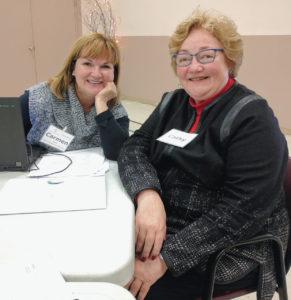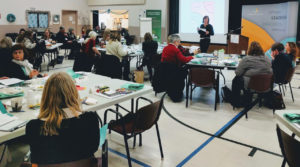Not a bad day in the life of an executive director. You go into a workshop worried about one thing, and come out pleasantly surprised, with useful take-aways.
Such was the experience of Alison Vandergragt, one of nearly 40 participants in a recent EvalU session in Renfrew, Ontario. EvalU is Capacity Canada’s boot camp on evaluation, which encourages community groups and social-service agencies to love data rather than loathe it.

“I went in there thinking this is going to be way over my head,” said Vandergragt, who heads Hope Reins, an agency that uses horses for therapeutic purposes. “But it was very user friendly, and it really struck home the value of collecting information.”
Held over a day and a half Dec. 5-6, the Renfrew EvalU boot camp attracted 25 organizations and three partners with Capacity Canada: Renfrew County Community Futures Development Corporation, Community Resource Centre (Killaloe) and the Ontario Ministry of Citizenship and Immigration.
Groups have to be wary of falling into the trap of thinking they are doing well as long as they’ve got cash flow and clients, Vandergragt said.
“We’ve never really taken a good look at how we can do things better,” she said.
“We can’t take that approach. We want to make sure we are asking the right questions, and whether we’ve got the right focus.”
This is particularly important, Vandergragt added, as one of the programs run by Hope Reins draws more and more attention. The War Horse Project exists as a local initiative to help soldiers and emergency-response workers manage post-traumatic stress disorder by caring for horses.
War Horse is now getting noticed in Ottawa, leading to the possibility of launching the program in other communities.

“The accumulation of statistics and stories helps organizations set a course for themselves and grow,” said Catherine Lang, one of the EvalU faculty. She works with Julie Witmer, another faculty member.
“Evaluation is never about one thing,” Lang said. “When you unpack it, it’s about strategic planning, or grant-writing, or something else… It informs how (organizations) design programs and look at what works and what doesn’t.”
The key thing, she said, is to build evaluation into the culture of an organization, small or large. Useful data can be statistics, user-experience stories, even feedback from participants at conferences and workshops.
“It all matters,” Lang said.
Bil Smith, executive director of the Community Resource Centre, described evaluation as a relationship-builder.
“It helps us tell our story to community funders,” he said. “It helps us prove the effectiveness of what we are doing.”
The Ottawa Valley Creative Arts Open Studio tells its stories in photos and video. For one project last year, the organization dispensed with the usual participant survey and had student interns roam the room to chat with people.
“We look at evaluation as an opportunity to grow the organization,” said artistic director Andrew Trull. “Asking the right questions challenges assumptions about what we are doing.”
Capacity Canada is planning other EvalU sessions in early 2017. For Hope Reins and the War Horse Project, the timing in Renfrew worked out perfectly because the organization is heading into a period of accelerated growth.
“I think overall we’re going to be able to take that information and really take a good look at our organization to see where the strengths and weaknesses lie,” she said. “We’ll create a plan for evaluating everything we’re doing, from the board through the staff.”
Details about upcoming EvalU sessions across Ontario are available at www.capacitycanada.ca/evalu. Sign up and stay informed as new sessions are announced.
Photos by Shubhagata Sengupta

